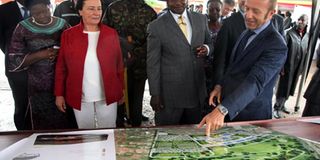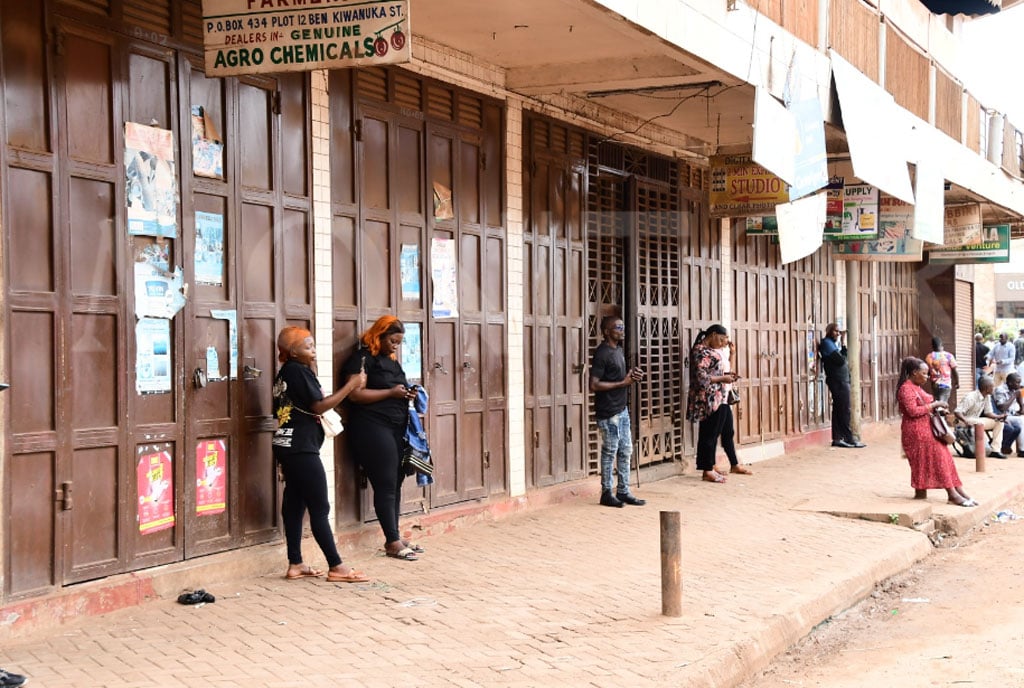Museveni criticises officials for frustrating hospital investor

President Yoweri Museveni at the ground breaking for construction of International Specialized Hospital of Uganda in Lubowa on June 1, 2017. PHOTO BY STEPHEN WANDERA
What you need to know:
- Health minister Jane Ruth Aceng acknowledged the negotiation delays but said it was as a result of the hardships in changing the details of the land title and also agreeing on the hospital designs which was a requirement for financing.
- The specialised hospital is expected to create employment for medical workers, training and also attract Ugandan medics working abroad.
Wakiso. President Museveni yesterday blamed government officials for delaying the construction of the specialised hospital at Lubowa, Wakiso District.
He also warned individuals claiming ownership of the land whose title is in government’s custody.
Mr Museveni, who presided over the ground breaking ceremony for the construction of the 264-bed capacity international specialised hospital of Uganda, blamed officials from the ministry of Health, Finance and the office of the Attorney General for frustrating the investor, FINASI, an Italian firm owned by Ms Enrica Penetti.
Speaking sarcastically, Mr Museveni said: “I wish to congratulate the Ministry of Health, Finance and the office of the Attorney General for delaying this project for five years.”
He wondered why negotiations by government officials with the investor took five years while it took him one afternoon to discuss and conclude the whole project with Ms Penetti.
The President assured Ms Penetti that the land title for 30 acres of land in Lubowa where the hospital is to be constructed is with government.
He said the land used to be a coffee plantation belonging to a British company known as Mitchell Courts but was later bought by government for the Joint Clinical Research Centre (JCRC), an HIV/Aids Centre.
“We took 30 acres of this land to construct this hospital. There is no way anybody can successfully claim this land,” he said while warning individuals who claim government land to frustrate government programmes.
President Museveni observed that the establishment of this specialised hospital in the country will cut unnecessary costs of US$186 million annually that Ugandans incur to travel to China and India to access medical treatment of complicated sicknesses.
“Financial haemorrhage of $186 million dollars for treatment abroad every year from Ugandans is a free donation equivalent to 90 per cent loss, which should be eliminated,” he said.
Upon completion, the hospital is expected to offer super-specialised services to patients which include; cancer treatment, heart diseases, neurosurgery (brain and spinal code surgeries), and organ transplantation.
Others include specialised accident and emergency units, intensive care and high dependence care units.
Mr Ahmed Sultan, the partner and general manager of FINASI, said the construction of the hospital project will last 24months at a cost of $250million (about Shs900 billion).
Negotiation delays
Health minister Jane Ruth Aceng acknowledged the negotiation delays but said it was as a result of the hardships in changing the details of the land title and also agreeing on the hospital designs which was a requirement for financing.
According to Dr Aceng, the hospital project is a Public Private- Partnership whose memorandum of understanding indicates that government will assume ownership after a period of 10 years.
“The proprietor, FINASI, will run the facility for a period of 10 years, they will be responsible for the human resources, the treatment of patients and the maintenance after 10 years, the hospital reverts back to government,” Dr Aceng explained.
“All government officials who are referred abroad will access services from this facility but for the private patients they have a right to choose on whether to come here or go abroad but it will be cheap to save transport and accommodation costs,” she said.
Employment
The specialised hospital is expected to create employment for medical workers, training and also attract Ugandan medics working abroad.



